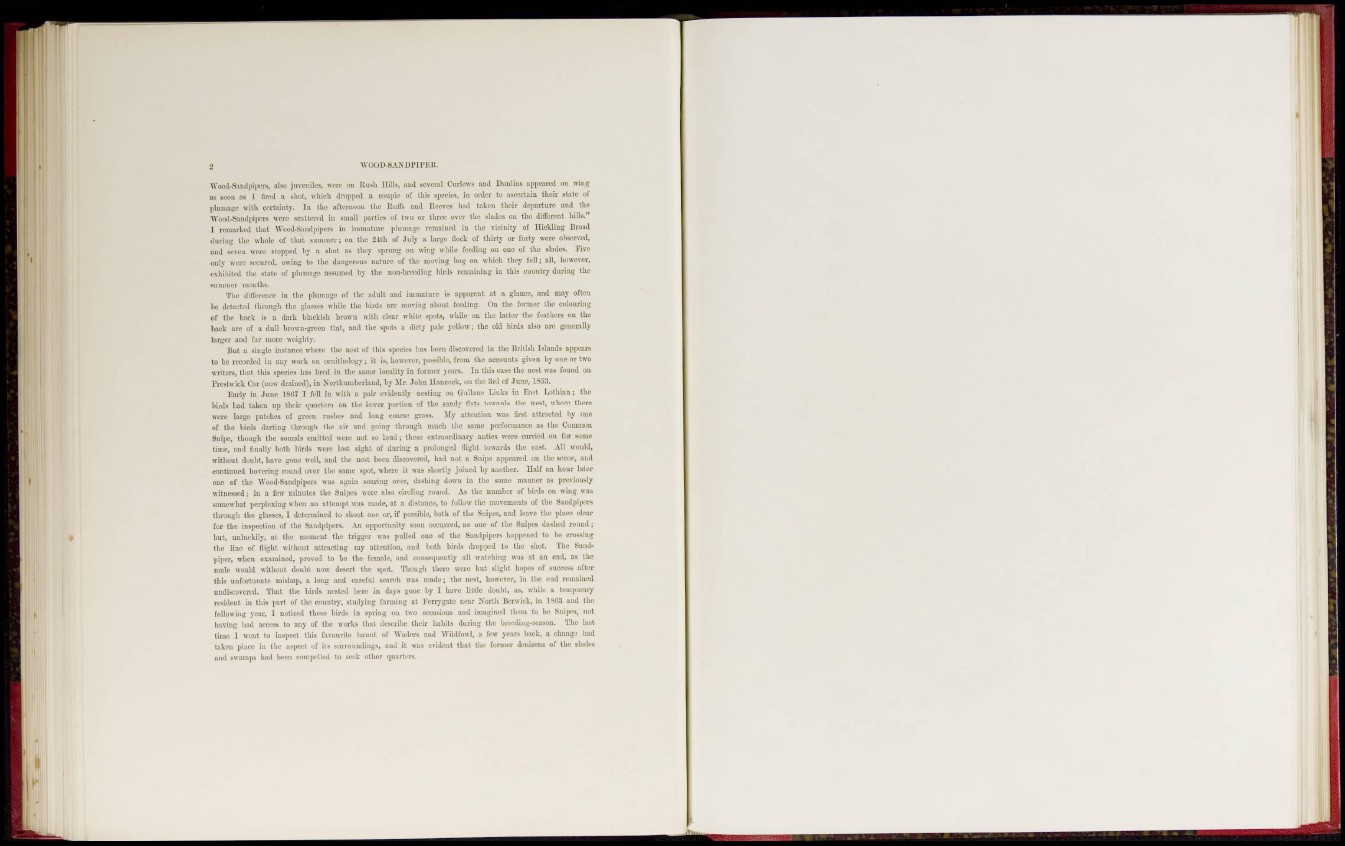
Wond-Snndpi[>crs, also juven¡les, were on Rush Hills, nud several Curlews ami Dunlins appeared un wing
as soon as 1 fired a shut, whirl] dropped a couple of this species, in order to ascertain their state of
plumage with certainty. In the afternoon the Hull's and Reeves had taken their departure and the
Wood-Sand pi pen, were scattered in small parlies of two or three over the shades ou the different hills."
I remarked that Wood-Sa ml pipers in immature plumage remained in the vicinity of Hickliug Broad
during the whole of that summer; on the 21th of July a large flock of thirty or forty were observed,
and seven were stopped by a shot as they sprung ou wing while feeding on one of the slades. Five
only were secured, owing to the dangerous nature of the muring bog on which they fell; all, however,
exhibited the stale or plumage assumed by the non-breeding birds remaining in this country during the
summer months.
The difference in the plumage of the adult and immature is apparent at a glanee, anil may often
be delected through the glasses while the birds arc moving about feeding. On the former the colouring
of the back is a dark blackish brown with clear white spots, while ou the latter the feathers on the
back are of a dull brown-green tint, and the spots a dirty pale yellow; the old birds also are generally
burger and far more weighty.
But a single instance where the nest of this species has been discovered in the British Islands appears
to be recorded in any work on ornithology; it is, however, possible, from the accounts given by one or two
writers, that this species has bred in the same locality in former years. In this case the uest was found on
Prest wick Car (now drained), in Northumberland, by Mr. John Hancock, on the 3rd of June, 1S53.
Early in June 1SG7 I fell in with a pair evidently nesting on Gillane Links in East Lvthian ; the
birds bad taken up their quartern on the lower portion of the sandy Hats towards the west, where there
WtM largo patches of green rushes and long coarse grass. My attention was tret attracted by ono
of the birds darting through the air and going through much the same performance as the Common
Snipe, though the sounds emitted were uot so loud; these extraordinary auties were carried on for some
time, and finally both birds were lost sight of during a prolonged flight towards the east. All would,
without doubt, have gone well, and the nest been discovered, had not a Snipe appeared on the seeue, and
continued hovering round over the same spot, where it was shortly joined by another. Half an hour later
one of the Wood-Sandpipers was again soaring over, dashing down in the same manner ns previously
witnessed ; in a few minutes the Snipes were also finding round. As the number of birds ou wing was
somewhat perplexing when un attempt was made, at a distance, to follow the movements of the Sandpipers
through the glasses, I determined to shoot one or, if possible, both of the Snipes, and leave the place clear
for the inspection of the Sandpipers. An opportunity soon occurred, as one of the Snipes dashed round;
but, unluckily, at the moment the trigger was pulled one of the Sandpipers happened to he crossing
the lino of flight without attracting my attention, and both birds dropped to the shot. The Sandpiper,
when examined, proved to be the female, and cmisc piently all watching was at an end, as the
male would without doubt now direct the spot. Though there were but slight hopes of success after
this unfortunate mishap, a long and careful search was made; the nest, however, in the end remained
undiscovered. That the birds nested here in days gone by I have little doubt, us, while a temporary
resident in this part of the country, studying farming at Perrygate near North Berwick, in 1 M I and the
following year, I noticed these birds in spring on two occasions and imagined them to be Snipes, uot
having bad access to any uf the works that describe their habits during the breeding-season. The last
time I went to inspect this favourite haunt of Waders and Wildfowl, a few year* back, a change hud
taken place in the aspect of iis surroundings, and it was evident that the former deni/.eus of the slades
and swamps liad been compelled to seek other quarters.